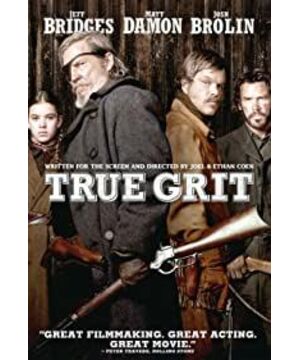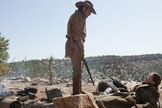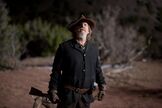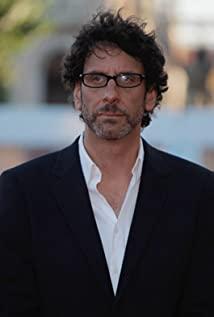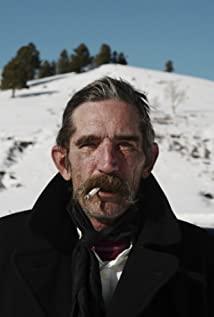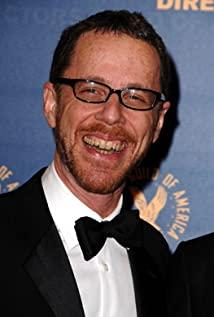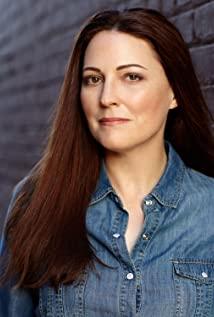(4) One place metaphor 1. The religious color of the film in the name of God has already been mentioned in the second section "Faith and Miracles", so I might re-examine it here. Speaking of the religious color of Cohen's films, it can be traced back to "Miller's Crossroads" (1990) or even earlier, but it is all faint and requires careful attention. Later, Cohen’s films became more religious, such as the time controllers and angels in "Shadow Tycoon"; the dying prayers and the flood in "Three Kings Escape"; the old man who doubted the law of God in "The Old Nowhere" The policeman; the university professor who questioned the meaning of life in "The Serious Man"...These scenes and characters are full of symbolic features and strong religious colors. They are enough to prove the proportion of God in the world of the Cohen Brothers. In "Thunder in the Land", the so-called "loyal to the original" by the Coen brothers, in addition to restoring Marty's perspective, there is also a restoration of religious elements in the novel. The film opens with a quote from the "Old Testament" and then points out the background of the Ross family's Presbyterian Church. Ethan Cohen said: "The presbytery norms shown by a fourteen-year-old girl made us interested and found this subject to be entertaining." Probably only the Cohen brothers can combine the awe-inspiring religion with "interest." Hooked up with "entertainment", and the movie itself did indeed do so, because the Coen brothers were originally interesting people. Looking at the movies of the Coen brothers, the most outstanding ability of the brothers is to make terrible people and terrible things in reality funny or even ridiculous. Therefore, they must also have the ability to distill the "interesting" things in religion into entertainment. From some of the "abnormal" behaviors of Mattie in the film, such as caressing about money issues, such as revenge as a weak woman, not only must the murderer be brought back to Fort Smith "for the crime of killing my father" ( (Place of the case) After the trial, Lebeauf said that he would take the murderer Chaney back to Texas (because he would get the bounty). Chaney would also be hanged, but Marty refused. Cogben said it was a big deal. You can torture him, such as cutting the soles of his feet and then sprinkling salt on it, but Mattie still refuses to agree. All of these are incomprehensible to us. The fundamental reason is the religious concept, which is the fundamental motivation that supports her so stubbornly that she is asking for trouble. Earlier, in the letter to my mother, “The Lord of All Things Will Bless Me” was stated. When she fell ill, the medicine she took was marked with the words “Approved by Pastor XX”, which shows the authority of the Presbyterian Church among the people. It also explained why her father had to be nosy, which led to the killing. In fact, Mattie’s behavior is quite similar to that of saints in religious history. Once the concept is established, Faith will become inevitable. Suffering and tiredness will not be a problem at all. We might as well compare Qiu Ju and Marty in Zhang Yimou's lens. In some behaviors, Qiu Ju and Marty are indeed alike, but they are not the same on the spiritual level – to support Qiu Ju. "The power of "is nothing more than the secular "can’t swallow this breath." What pushes Mattie forward is entirely from the power of religion: she firmly believes in the existence of God, so she firmly believes that justice must be done and must follow a certain form. Or a specific ceremony. 2. In the name of the father, the Cohen brothers always appear in the movies of some very unlucky ones. Except for the hapless "Sister Milk Killer" and "Burn After Reading", they are scattered in every movie with Cohen In the film of the label, it is unforgettable. It was just a simple thing, but each of these hapless guys acted like cats playing with thread balls. They not only messed up the thread balls, but also wrapped themselves in them and couldn't get out. Although the ending is always bleak, we, as the audience, do not feel sad, because in the process of witnessing the unlucky guys making their own mistakes, we will see various weaknesses or dark sides of human nature-the so-called poor people must be hateful. In this way, it is not possible to shed tears of sympathy for any miserable person. But in "Thunder in the Ground", the situation is different. There are still unlucky ones, such as the murderer Chaney, such as the two killed in the cabin, but these few are unlucky because they should have been unlucky. The biggest difference between this film and the previous Cohn movies is that the Cohn brothers do everything they can to show us the best side of human nature. We identify with Matty, who has sharp teeth, and we will gradually identify with the sloppy and drunk Kogben, and we will identify with Lebeuf, who is dressed in funny clothes and talks, just because he came forward at a critical moment. . The strange thing is that after seeing Cogben’s various evils, we not only do not hate him, but admire him more and more, so that his final sublimation is not blunt-who would question why he was a drunk The child becomes a hero? As if he should have been. However, after watching many times, I still can't tell from what moment the one-eyed sheriff began to show the quality of flashing, because he still looked muddled until the last moment. And this way of portraying characters in contrast to previous similar films is precisely the most remarkable thing about this film. There is nowhere to search through iron shoes. Compared with the long chase, Chaney's appearance was unexpected, a bit abrupt, and his death was easy, even inexplicable-obviously, this was deliberately arranged by the Coen brothers. What they want to show is just the process of chasing. The road of chasing murder for thousands of miles , In fact, is Mattie’s spiritual journey. Behind her father’s feud is the secret Electra complex—at the beginning, she just wanted to explain to her father who died unjustly, but as the film unfolds, the figure of her father is like a mountain. , Can no longer be erased from her life. The body lying in front of the tavern at the beginning of the movie was Mattie's father who was shot by Chaney. We later learned that his name was Frank Rose. We never saw his true face, and there was no flashback (the word "flashback" is not in the Coen brothers' dictionary) to show his face. The lack of the image of the father is a metaphor for Mattie's inner blockade. It is a deep wound in her heart. In order to heal the wound, she can only bury her father in the bottom of her heart, so there is no tear. She found Kogben and tried to heal her pain in the name of revenge. Perhaps she really thought that she could make up for the pain by slashing the enemy. Inadvertently, in the process of chasing the murderer for thousands of miles, Marty found another "father", a man who was completely different from his biological father, but filled the position of father. From the moment when Marty created the first cigarette for Kogge, a rough man and a little girl have established a special and inexplicable relationship-they are partners on the road to murder, yes Father and daughter in disguise, some even say that there is still a kind of ambiguity between them, similar to the relationship between Leon and the little girl Mathilde in "Killer Leon", but the former has to be obscure and secretive. many. After all, the time background of "Thunder in the Land" is the United States in 1878, or the Wild West, while the background of "Leon" is New York in the 1990s. So the two are not comparable. In the beginning, Marty and Kogben were only hired and hired. The reason why Marty chose Kogben was because he was "ruthless"; Kogben agreed to help Marty just for money The U.S. dollar is called "a huge sum of money"). No matter how Kogben doesn’t wait to see this little girl who speaks with thorns, but the green ticket in her hand is genuine. The reason why he embarked on the path of chasing the murderer is completely indifferent to "sympathy" and "pitiful". . But after learning about Mattie's clever teeth, he was bored with the little girl, wishing to be as far away from him as possible, so he bought a ticket and wanted to send her home. Here, of course, you can also examine this ticket from another angle. It may be the first time Kogben showed goodwill. After all, he bought it with his own pocket. He was like a father for the first time, from the moment he pointed the gun at Lebeuvre, who suspected Mattie was getting in the way and was spanking her. Compared with Cogben, Lebeauf is much weaker in appearance and personality. Although he behaves like a father when he punishes Mattie, Marty still chooses Cogben. In fact, Lebeuf and Cogben quarreled and quarrelled along the way. It is like a fight for the authority of "father". The most obvious evidence is that Lobeuf complained more than once: "You changed the way to make me look stupid in front of this little girl." Of course, whether it was Lobeuf or Cogben, they did not realize the underlying reason for their "rivalry". In the process, Mattie's balance always leaned to Cogben's side, and the only time he was inclined to Lebeuf was after he was injured, but most of it was out of sympathy for the weak. With Lebeuf leaving the team again, his image as a "father" has been lost. I thought, this was a deliberate arrangement by the Coen brothers, because every time Lebeuf made a small achievement, it was a big failure. From a certain perspective, Lebeuvre is just a savior, not a "father". Throughout the film, the seemingly unreliable Kogben really can afford the role of "father"-he is the spiritual father of Mattie. With Cog, Marty is safe, but once he is not with Marty, the danger will suddenly come-first he encounters his enemy Tom Chaney by the river, then he falls into a cave and is bitten by a snake. hurt. When camping for the first time, Kogben used rope to prevent snakes. When Marty did the same, Kogben said: "You are too young and too skinny. Snakes are not rare." In the plot, you will find that Koge was already unconsciously assigned the duty of guardian. Faced with Marty, he of course would not admit it, but his deeds are unsealed deep in Marty’s heart. Wounds are indeed effective treatments. When the two chatted, Mattie once told Cogben about the time she spent with her father in the past, such as hunting and picnics. These all showed from the side that her subconscious was calling for a substitute for her father, and this substitute was not a test. Geben is none other than. The climax of the film, or the best moment of the film, is the passage where Marty is bitten by a snake and Kogben rides on Xiao Hei and hugs Marty. It should be said that this is a classic Hollywood passage. As far as I know, such a lyrical/sensational passage is the only example in the Coen Brothers movie. At this moment, Marty is in a trance, and in the distance is a sunset that will not fall, the scenery is gorgeous, the horses are screaming, and her own life is difficult to tell, but at this moment Marty looks very calm, even happy. , Because she is in the arms of "father". And then came the most touching moment of the film: Kogben, who ran to the Indian house with Mattie in his hands, fell exhaustedly, took out his gun and slammed to the sky, and for a moment, the light in the cabin turned on, Kogben knew , It was the light of life, then, he drooped his head and said: "I am old!" ("Ihavegrownold") Why did Kogben fight for his life and save Mattie? Except for being one enemy and four before, there is no fear to death Escape showed a small face (from another point of view, this is another proof of his bravery), this guy is clearly a person who is soaked in alcohol all day long and seems to be indifferent to everything, I thought, maybe It was Mattie who proved that she was a good partner and a great girl. Her tenacity and perseverance made people like Kogben admire; or the indescribable emotion between them, including The friendship of partners, the sympathy of the strong for the weak, the concern of the elders for the younger generation, and the appreciation of a strong opposite sex. As mentioned earlier, Marty tried to heal the pain of bereavement through revenge. When Kaoge appeared in her life like another "father", and then quietly left, it was tantamount to having experienced another "father bereavement". "The pain, for Mattie, this time has a more profound impact than the last time. Why is this so? After all, she spent the previous fourteen years under the protection of her biological father. From the words in the film, we can see that the influence of her father on her and the position in her mind are far more important than her mother (the mother is sick, not Literacy, never seen the world), she loves her father, so she spares no money to work hard to catch the murderer; compared to the biological father, the common adventure with Kogben is only a short time, but the latter replaces the biological father in one fell swoop. Become a lingering shadow in her life, and even if Kogben died, he had to take his bones back to her cemetery. This can be seen from the conversation between Marty and Cogben during the first camping. Marty said that he had hunted homelessly with his father before. Cogben ridiculed: Do you think chasing a murderer is as simple as hunting? It can be seen that although the time with Kogben was short, it was so unforgettable, but the time spent with his biological father gradually drifted away and became blurred. Kogben's huge figure concealed the image of his biological father, and eventually the two merged into one, firmly occupying a corner of Mattie's mind. If Mattie’s Electra complex was originally a vague existence in the subconscious, then Kogben amplifies and solidifies this existence, so that it can no longer be relieved and melted. The end of the film deliberately confessed the ending of Mattie and Cogben. At this time, it has entered the 20th century (1903), and it has been 25 years since the story happened. For anyone, twenty-five years is a long hair month. Although Marty and Cogben never saw each other after the separation, it is obvious that the latter has affected the life of the former. The reason why she is unmarried, or is also related to this man, because subconsciously, Cogben is what she finds for her husband. Standard, but such a man is unavoidable. Moreover, with the infiltration of capital from the east, the west is no longer the original west, and pioneers and cowboys have long become legendary characters. For Mattie, a broken arm is both physically disabled and heartbroken. It Always reminding her of the missing part of her life. When Mattie put Kogben into the soil, turned and left the cemetery, the figure drifted away, disappearing to the other end of the horizon, and even the desolate folk songs sang, and the ending subtitles rose, we as audiences would not feel for Mattie Sad, because she is not in pain, she is as strong as ever. Probably the Coen brothers also don't want their audience to be heartbroken by this, but only want us to see the fate that cannot be escaped. Yes, everything in the world is destiny. Mattie is a strong man, she knows how to take it calmly. 3 The first thing the hillbilly needs to watch a Coen Brothers movie is to concentrate, be mind-free, and not miss a shot or a line, because once you miss it, you are likely to be confused about the progress of the story, or even inexplicable. Because the Coen brothers are not only masters of storytelling, but their stories are all made up of trivial details: a gesture, a look, a word can change the direction of the story and the fate of the characters, most importantly, The metaphors and black humor with Cohen's label are also all in these details. In addition to the smiley humor and headache-inducing metaphors, the Cohen brothers' films are also scenic films with local American characteristics. This is also the most pleasant and relaxing time to watch Cohen's movies. The so-called "local characteristics" are certainly not New York, Los Angeles or Chicago. Although these super cities have their own characteristics, they have been talked about by Hollywood countless times. The Coen brothers seem to love small towns in the United States very much, such as Texas in "Blood Maze" and "Old Nowhere", Minnesota (the hometown of the Cohen brothers) in "Ice Blood Storm", Mississippi in "Three Kings Escape", etc. Wait. In these small places in the movie, you can see all kinds of little people, each of them speaks strange accents that can be heard without having to pass CET-4. At first glance, they are a hillbilly, and these people are the ones in Cohen's movies. The most interesting characters, the hapless guys mentioned earlier, these guys always make simple things extremely complicated, very oolong but extremely vivid. In "Thunder in the Ground", the background of the story was changed to Arkansas, and because it was a story more than 130 years ago, there was still a bit of mystery in the rustic. For example, in the grocery store where Kogben lived, his landlord was an old Chinese man. Where did he come from? What has he experienced? Why did he live here and earn a share? Yes, whether it is Lao Mei or us, it will be both interesting And mysterious. There is also the travel doctor wearing a bearskin mask, which also gives the audience a sense of mystery of "where are they from and where they are going". Even dressed up as "fashionable", Lebeuf, with the rattling spurs, will give people a similar feeling. What brings mystery is the local people’s attitude towards corpses, "It" can be used as currency for bartering, and it can also be sold for money. The teeth are worth a lot, which sounds confusing. The other two lovely things about the hillbilly or country culture are boasting and unfounded, self-righteous "science." Take Kogben and Lebeuf as examples. The former threatened to hit an insect in the eye from 50 meters away, but couldn't even handle a wine bottle three meters away. He also said that he once served as ten, and Marty would be suspicious of this. Of course, this is not all bragging. Later, he really staged this scene, the process is called heroic and unrestrained, but ten turns into four. The most impressive thing is the richness of the language. It is said that one reason why the Coen brothers chose "Thunder in the Ground" is that the language of the novel is very distinctive, especially the dialogue, humorous and full of overtones. When reading it, it seems to be immersive, as if back to that era. As a result, the two brothers transplanted the dialogue in the novel almost intact into the movie, and with the help of the interpretation of several top actors-such as the guttural voice of Governor Jeff Bridges, deliberately amplified the effect of laziness. ; Matt Damon’s Texas accent is even more comical after his tongue is injured, and it is a perfect match for that outfit; there is also the abbreviation of the robber boss Ned, which is probably what the person without his lower lip talks about. Looks like it; the most amazing thing is the travel doctor wearing a bearskin mask, with a mouth that swells and frustrates, which is similar to singing. The Coen brothers are really enjoying themselves. Of course, as a non-native English speaking audience, it is difficult for us to appreciate the beauty of it, or even the difference between the local accent and the standard pronunciation, let alone dialect slang. For example, Kogben asked Marty: "What yougot thereinyourpoke?" The word poke here originally meant to poke or poke, but here it means a bag, not to mention us, even ordinary Americans don't know this usage. There are also some ridiculous words that cannot be translated at all in Chinese. For example, Kao Geben shoots a wine bottle to verify his marksmanship, but he always fails to hit him. Lebeuf sneered: "I thought you would say that you had sand in your eyes...or you should say that sand was in your eyes." The first "eyes" refers to the eyes, and the second "eyes" (eyes). ) Refers to one eye, which is Lebeuf's one eye made fun of Kogben through the singular and plural variations of English. Later, the robber boss Ned said that Kogg was originally a "one-eyedfatman" (one-eyed fat man), which is a classic line in the old version, and the new version continues to be used. Another use of the hillbilly is to be funny. Whether it is the accent of the turtle, the strange dress, or the "science" for no reason, people can't help but laugh now. The old version of "Thunder in the Ground" also has a lot of comedy factors, even John Wayne, who is always serious, is also very funny, but he laughed differently, and the two sides laughed differently. Comedy can also be regarded as a style of Cohen’s movies, but their comedy cannot be measured by whether they laugh or not. "A little bit of interest" is the realm they expect and pursue. Sometimes it seems that they can understand some meaning from "a bit of interest." ——This "meaning" is roughly equivalent to "serious philosophy", but it's not entirely true. Now, the label people put on the Coen brothers is "black humor," so black humor has become the most recognizable label for the brothers. For example, there was an execution scene shortly after the film began, and there were three prisoners on death row. They all had the right to say a few words before hanging, which could be regarded as "dying words". The first two were white people and each said a lot, but when it came to the third, the executioner put on his headgear before he finished saying a word because he was an Indian. Did you think of some serious big words from this action, such as "human rights", "racism" and so on, but this scene itself makes people feel very funny, thus dispelling those big words you thought of Son. In the next scene, Mattie learned from the hotel owner that the execution also promoted the tourism industry in Fort Smith, and even the hotel was overwhelmed. She had to squeeze in a bed with an old woman and cover a quilt, old woman. As soon as she turned over, Mattie had to be frozen. As for the dumb fool, it goes without saying. The first is the murderer Chaney. As the number one villain in the film, he was bullied by his accomplices to the point of almost sympathy. There is also the robber who learns to call the beast and poultry. There is still a distance between this buddy and the idiot-he is simply mentally retarded. When Kogben was against the bandits, he was also among them, but only saw him. The horse galloped forward, but forgot to shoot. And the businessman who bargained with Mattie, under the pressure of the little girl, was at a loss as a rookie. Thank God for giving the Cohen brothers a humorous heart, so many laughs dispelled the seriousness of the theme of Cohen’s movie
View more about True Grit reviews


